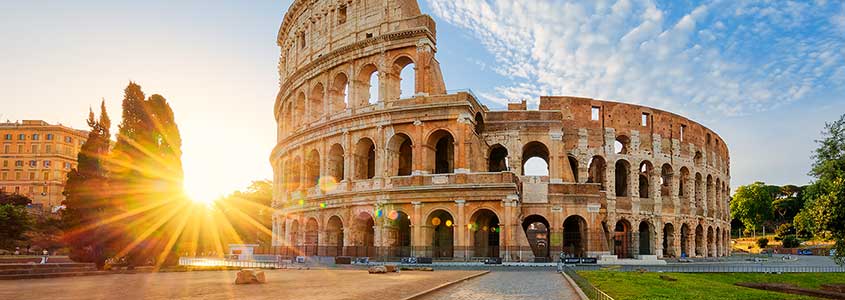Residence in Italy
Italy is known to the general public for its impressive history and culture, fabulous food, great Mediterranean climate, football, fashion and ‘La dolce vita’. In short, Italy is an ideal holiday destination and one of the best locations for a second home.
Moreover, since launching a tax (and visa) regime for wealthy international families wishing to move to Italy, Italy has also become an alternative jurisdiction for affluent families to permanently relocate to.
Italy’s history
Italy’s history is extremely impressive and reaches very far back, starting long before the well-known historic period of the Roman Empire, which had an everlasting influence on a large part of Europe. Modern Italy dates back to the Kingdom of Italy, which was founded on 17 March 1861, when King Victor Emmanuel II of Sardinia was proclaimed King of Italy.
On 2 June 1946, shortly after the end of the Second World War, after holding a public referendum, Italy became a Republic.* Nowadays Italy counts well over sixty million inhabitants and it is, in terms of size, one of the larger European nations.
Italy’s long and rich history has had considerable influence on many other nations, in particular because all Roman languages originate from Latin, and the Latin alphabet, the Catholic Church, modern accounting, a comprehensive codified legal system and the Renaissance are part of the Italian cultural heritage.
*Source: https://www.britannica.com/place/Italy/
Italy’s government & economy

The Prime Minister is the head of government: the head of the Council of Ministers. He/she and the cabinet are appointed by the President, but in order to come into office the cabinet must pass a vote of confidence in Parliament.*
Italy is a founding member of the European Community, now the European Union (EU), and the G7. It is also a full member of NATO and the OECD. Italy is part of the Schengen area and the Euro is its currency. Italian is Italy’s only official language.
Italy is one of the largest economies in the world. It has a mixed economy, with manufacturing, luxury goods, trade and agriculture, including the production of wine, being some of the important sectors. Tourism also plays an important role in the Italian economy. Italy’s history and culture are one of the main reasons for this – the country counts over 50 UNESCO world heritage sites. Small and medium-sized enterprises play an important role in the Italian economy. The economy of the northern part of Italy is much stronger than that of the southern part of the country. This is reflected in its contribution to the Italian GDP and the level of unemployment in both parts of the country.
Italy’s government debt ratio is in comparison to other countries relatively high. It therefore has on average a BBB-credit rating.
*Source: https://www.britannica.com/place/Italy/The-legislature
Taxes in Italy
Italy’s system of taxation is comparable to that of most other countries in the EU. It taxes the worldwide income of its residents based on a progressive personal income tax rate.
- Personal income tax: families who have chosen to relocate to Italy (and who do not opt to be taxed as Italian non-domiciled persons [see below]), are taxed on their worldwide income and capital gains. All income has to be declared to the Italian tax authorities, be it income from dependent or independent personal activities or investments.Progressive rates apply and relate to the type of income received. The standard rate ranges from 23% to 43%, with the highest rate becoming applicable on any income received over an amount of EUR 75,000. The income tax owed is increased by a regional surcharge of 1.23% to 3.33%. Municipal surcharges (up to 0.9%) may also apply.Most types of investment income, interest, dividends and capital gains, are taxed at a special rate of 26%. A rate of 12.5% applies to interest paid on Italian government bonds and government bonds from white-listed jurisdictions.
- Wealth tax: Italy does not levy a net wealth tax, but a tax of 0.2% per year applies to financial assets held abroad (this tax does not apply to foreign life insurance policies).
- Inheritance tax and gift tax: Italy levies both gift tax and inheritance tax on a worldwide basis. The applicable rate of taxation ranges from 0% to 8%, depending on the relationship of the parties to each other and the amount involved. For the spouse, direct descendants and ascendants, a tax-exempt amount of 1 million euros applies per individual. For that group of individuals, the applicable tax rate on the remainder is 4%. Inheritance tax does not apply to foreign life insurance policies.
- VAT: Italy levies a Value Added Tax (VAT). The standard rate of VAT is 22%. Reduced rates of 4%, 5% and 10% apply to certain services and goods. A small number of services are completely VAT-exempt, for example medical services and certain financial transactions.
- Exit tax: when you decide to leave Italy and emigrate to another jurisdiction, Italy does thus far, not levy an exit tax.
Source: The International Bureau of Fiscal Documentation. Last updated: September 2019.
Special tax treatment of foreigners relocating to Italy
In 2017, Italy launched a special tax regime for wealthy foreigners wishing to take up (tax) residency in Italy. Wealthy Italian citizens currently living outside of Italy and wishing to relocate back to Italy can, under certain conditions, also opt for this special tax regime. The regime is also referred to as the Italian non-domiciled tax regime.
Who is eligible?
- Non-Italian citizens who thus far have never been a tax resident of Italy; and
- Italian and non-Italian citizens who have not been a tax resident of Italy for at least nine out of the last ten years,
are eligible for the special tax regime.
Individuals who have moved to Italy and fulfil the above criteria may submit a request for the special tax treatment to the Italian tax authorities. The Italian tax authorities can be requested to issue a binding advance tax ruling with their decision (this is not obligatory, but recommended). The ruling can be requested before you actually take up residency in Italy. The ruling is valid for 15 years, allowing the applicant to remain in Italy for 15 years with the Italian special tax regime being applicable to him/her.
Persons who intend to relocate to Italy (and who are eligible) are not forced to apply for the special non-domiciled tax regime, but also have the possibility to opt to be taxed on their worldwide wealth and income under the normal tax regime (as described above under Taxes in Italy).
Italian income tax to be paid
The income tax liability of the individual who has relocated to Italy and who applies for the special tax regime will be fixed at EUR 100,000 per year (substitute tax), regardless of his/her actual income abroad. This means that foreign income, such as dividends, interest, income from real estate and employment, will not be taxed in Italy in any way (also not at the moment that it is remitted to Italy).
However, income consisting of:
- all Italian-based income (including Italian investment income); and
- capital gains from ‘qualifying holdings’ (held in whatever jurisdiction) realised in the first five years of Italian tax residency,
will be taxable in Italy (all standard domestic tax rules will apply) in addition to the above-mentioned amount of yearly tax payable, namely EUR 100,000. What makes the Italian special tax regime stand out, is the possibility for applicants to request to have foreign income from certain jurisdictions excluded from the scope of the special tax regime. As a result, this income will be directly taxed in Italy and the provisions of the relevant double taxation treaty will apply.
❝ Italy’s special tax regime can be opted for by wealthy foreigners ❞
The Italian wealth tax of 0.2% per year, which applies to financial assets held abroad, is not applicable to residents to whom Italy’s special tax regime applies. Foreigners using the Italian non-domiciled tax regime are exempt from a number of (tax) reporting duties and the Italian controlled foreign company (CFC) rules also do not apply to them.
For each family member (spouse, children(-in-law), parents(-in-law), siblings) also relocating to Italy, an additional fixed amount of EUR 25,000 of substitute income tax will need to be paid in order for them to enjoy the special tax regime as well.
Inheritance tax and gift tax liability
The Italian gift tax and inheritance tax will only be applicable to Italian (situs) assets. Any assets held abroad will be out of scope of the Italian gift tax and inheritance tax.
Difference between EU and non-EU citizens
Both EU (including EEA and Switzerland) and non-EU citizens who would like to move to Italy can benefit from Italy’s special tax regime. In the case of non-EU citizens, an investor visa should be obtained first. More about the Italian investor visa can be found below.
Benefits of living in Italy
Italy is quite a large country. It therefore offers a lot of different possibilities to families who want to relocate there. One can live high up in the north in the stunning nature of the Italian Alps, on the sunny coast of the Mediterranean or the Adriatic Sea, in Sicilia or in the buzzling heart of Rome, with its population of over 4 million people and impressive cultural heritage. The northern part of Italy, with the exception of the actual Italian Alps, is on average much more densely populated than the southern part of Italy, with the exception of Rome and the Naples area.
Due to its geographic location and size, Italy has quite a diverse climate with the continental and Mediterranean climates being the main climate types. Winters in the Alps can be very cold and in the south and centre of Italy (not directly on one of its coasts) the summers can be relatively hot.
Connectivity with other jurisdictions is well-organised. Italy can be reached over land via France, Switzerland, Austria and Slovenia. It has sea connections with Croatia, Montenegro, Albania, Greece, and France. Italy also has numerous airports, with the airports of Rome, Milan and Naples being the largest of them, offering the most international flight connections.
The school system in Italy is primarily organised by the state and can be attended for free, until children reach the age of seventeen. Education is provided in the Italian language. There are some private (international) schools. The largest cities in Italy also have a local university.
Real estate in Italy is available in all sizes, qualities and prices. From an old winery in Tuscany to beautiful apartments in the centre of Rome, everything is possible and available. Prices very much depend on the size, quality and age of the property. As it is a large country, prices can considerably vary locally.
Health care services in Italy are provided both publicly and privately. Especially in more remote areas, it will be difficult to have direct access to private healthcare. Italy definitely offers a great quality of life, which is reflected in one of the highest life expectancies in the world. The Italian culture attracts visitors from all over the world. There is an abundance of culture, architecture, visual art, literature, theatre, fashion, design, music and cinema to enjoy, see and/or visit. The national sport of Italy is football, beating by far all other popular sports such as tennis, cycling, motorsports and skiing.
Visas and residency permits
If you are interested in moving to Italy, it is advisable to first visit the country. EU, European Economic Area (EEA) and Swiss nationals do not need a visa to visit Italy. It is of course advisable to bring a passport or other valid travel document.
❝ Italy offers non-EU-citizens a low-barrier investor visa programme ❞
For non-EU nationals, a valid travel document is needed to travel to Italy and in most cases also a Schengen visa. The Schengen visa needs to be valid throughout the stay in Italy (you are also allowed to stay in other Schengen jurisdictions). The holder of the Schengen visa needs to have the financial means to pay for the stay and return trip and be covered by a valid travel (health) insurance policy.
When in possession of a Schengen visa, foreigners are allowed to remain in the Schengen area for a maximum of 90 days (spent over a period of 6 months). Those who want to remain longer must apply for a residency permit. In order to obtain employment, even for less than 90 days, a residency permit is always obligatory.
Becoming a resident of Italy
Citizens from the EU, EEA and Switzerland
Wealthy nationals from EU jurisdictions, EEA jurisdictions and Switzerland do not need immigration permission to take up residency in Italy. Once they establish themselves in Italy, they nevertheless need to observe several administrative steps in order to legally establish themselves in Italy. You will need to register with the Italian tax authorities in order to obtain a tax registration number and you will need to register with the local municipality. Every family member needs to follow this procedure.
Non-EU citizens
Since 2017, Italy offers an investor visa programme for non-EU citizens. This programme makes it relatively simple for wealthy non-EU citizens to obtain residency in Italy.
The Italian investor visa programme for non-EU citizens
Wealthy non-EU families wishing to relocate to Italy may apply for an Italian residency permit for investors. Such an application needs to be submitted (and approved) before actually coming to Italy.
Conditions to apply for an Italian investor visa
The investor should invest in Italy in one of the following ways:
- he/she should invest at least EUR 2,000,000 in Italian government bonds. These government bonds should be held for at least two years; or
- he/she should invest at least EUR 500,000 in an Italian company, or alternatively, EUR 250,000 in an ‘innovative’ start-up company in Italy, which is registered in a special section of the Italian Chamber of Commerce. This investment should be held for at least two years; or
- he/she should donate at least EUR 1,000,000 to support a project in Italy in the field of education, culture, scientific research, etc. (a philanthropic donation).
Source: https://investorvisa.mise.gov.it
The procedure
In order to apply and obtain the Italian investor visa, the foreign investor will need to:
- demonstrate that he/she is the actual beneficial owner of the mentioned financial amounts. The money needs to be freely available to him/her and ready to be transferred to Italy. Self-certification will suffice for this purpose. The funds need to have been obtained lawfully;
- submit a statement in writing in which he/she confirms his/her intention to actually make the investment or donation within three months of taking up residency in Italy; and
- demonstrate that he/she will have enough income (> EUR 8,500) so as not to qualify for the exemption from the obligatory healthcare contribution.
At least the following documents will need to be filed with the application:
- a certified copy of his/her passport, which should be valid for more than two years and three months; and
- a description of the actual investment or donation.
If the application for a temporary residency permit (the investor visa) is granted, it will be issued for two years and can be renewed for an additional three years. Family members are allowed to apply for a temporary residency permit for family reasons.
After 5 years of lawfully staying in Italy, non-EU citizens are entitled to apply for long-term resident status in Italy.
Italian citizenship
A short-track or easy procedure to obtain Italian citizenship does not exist as such. There is also no dedicated Italian citizenship programme.
Depending on whether the applicant is an EU-citizen or a non-EU-citizen, a foreigner who has taken up residency in Italy can apply for Italian citizenship if he/she has been living in Italy for at least four (EU-citizen) or ten (non-EU-citizen) years.
In order to apply for Italian citizenship you have to submit, among other things:
- a copy of your passport;
- a copy of your birth certificate;
- your history of legal residence in Italy;
- tax declarations for the last three years;
- certificate of good conduct from Italy and your country of origin.
In order to acquire the Italian nationality, it is not necessary to relinquish your original nationality. This makes it possible for foreigners who have relocated to Italy to hold dual citizenship once the Italian passport has been issued. A request for Italian citizenship may be rejected.
Leaving your home country and immigrating to Italy

Although the process is relatively straightforward, you should nevertheless always keep in mind that actually leaving your former home jurisdiction often presents a bigger challenge than taking up residency in Italy.
Moreover, when relocating to Italy, careful consideration and professional planning are necessary to prevent being confronted with, for example, exit taxes in your former home jurisdiction, or other negative tax effects. You should also prevent a situation where the move out of the country is not legally recognised, particularly for tax purposes, because you do not actually spend enough days per year in Italy.






